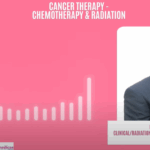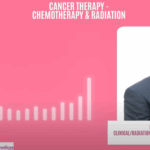
Clinical and Radiation Oncologist at the Sweden Ghana Medical Centre, Dr Stephen Kpatsi, has encouraged Ghanaians to embrace radiation therapy as a safe and effective option in cancer care, dispelling common fears and misconceptions about the treatment.
Speaking on Joy FM’s Super Morning Show as part of the Cancer Awareness Month Series, Dr Kpatsi explained that radiation therapy remains a key component of cancer management and, in some cases, can even cure the disease when detected early.
“Radiation treatment has done a lot of good for many people,” he said. “There are patients with prostate and breast cancers who have been cured completely, and others whose pain disappeared within a few days of treatment.”
Dr Kpatsi explained that radiation therapy uses controlled doses of high-energy rays to destroy cancer cells.
“Unlike surgery, where the tumour is physically removed, or chemotherapy, where drugs travel through the bloodstream, radiation is invisible like sunlight,” he said.
“It’s directed at the specific area where the cancer is, and it damages the DNA of those cancer cells so they can’t grow or survive.”
The therapy, he said, targets only the affected area, leaving the rest of the body unharmed.
Radiation therapy is used to treat several types of cancer, including breast cancer, Cervical cancer, Prostate cancer, Soft tissue sarcomas, Head and neck cancers, and brain tumors.
“Some patients receive radiation at the beginning of their treatment; others may need it later on, depending on the cancer’s stage and location,” he explained.
Dr Kpatsi said radiation is delivered in small daily doses, usually over several weeks, to achieve the full effect while protecting healthy tissue.
“For instance, a prostate cancer patient may receive radiation for about 20 to 39 days,” he said.
“A breast cancer patient might go through 25 to 30 sessions, often Monday to Friday, with weekends off.”
Patients with advanced disease or bone metastases may require shorter courses, sometimes lasting just a few days, mainly to relieve pain or improve mobility.
Addressing widespread myths, Dr Kpatsi clarified that radiation treatment does not make patients radioactive, nor does it expose their entire body.
“We don’t radiate the whole person,” he said. “It’s usually just a limited area. Unfortunately, some patients refuse treatment after hearing false stories, and that’s very worrying because radiation saves lives.”
He compared medical radiation to common technologies such as X-rays and microwaves.
“The same principle applies, but the doses used for treatment are much higher and carefully controlled,” he added.
The duration of radiation therapy depends on the type, stage, and spread of the cancer.
“Early-stage breast cancer patients may complete treatment in under six weeks, while those with more advanced disease might need a different plan,” he said.
On cost, Dr Kpatsi acknowledged that prices vary between public and private facilities.
“In some centres, the National Health Insurance Scheme covers part of the cost,” he noted. “It can be expensive for some families, but it’s still far more accessible than travelling abroad, which only a few can afford.”
“If you notice anything unusual, please go to the hospital,” he urged. “Not talking about it or avoiding the hospital doesn’t take the problem away. If you come early, you can be treated, sometimes completely cured,” he added.
He also encouraged the public to ask questions and stay informed rather than relying on hearsay.
“We have the technology, the expertise, and the treatments right here in Ghana.What we need is for people to show up early.”
- President Commissions 36.5 Million Dollars Hospital In The Tain District
- You Will Not Go Free For Killing An Hard Working MP – Akufo-Addo To MP’s Killer
- I Will Lead You To Victory – Ato Forson Assures NDC Supporters
Visit Our Social Media for More




